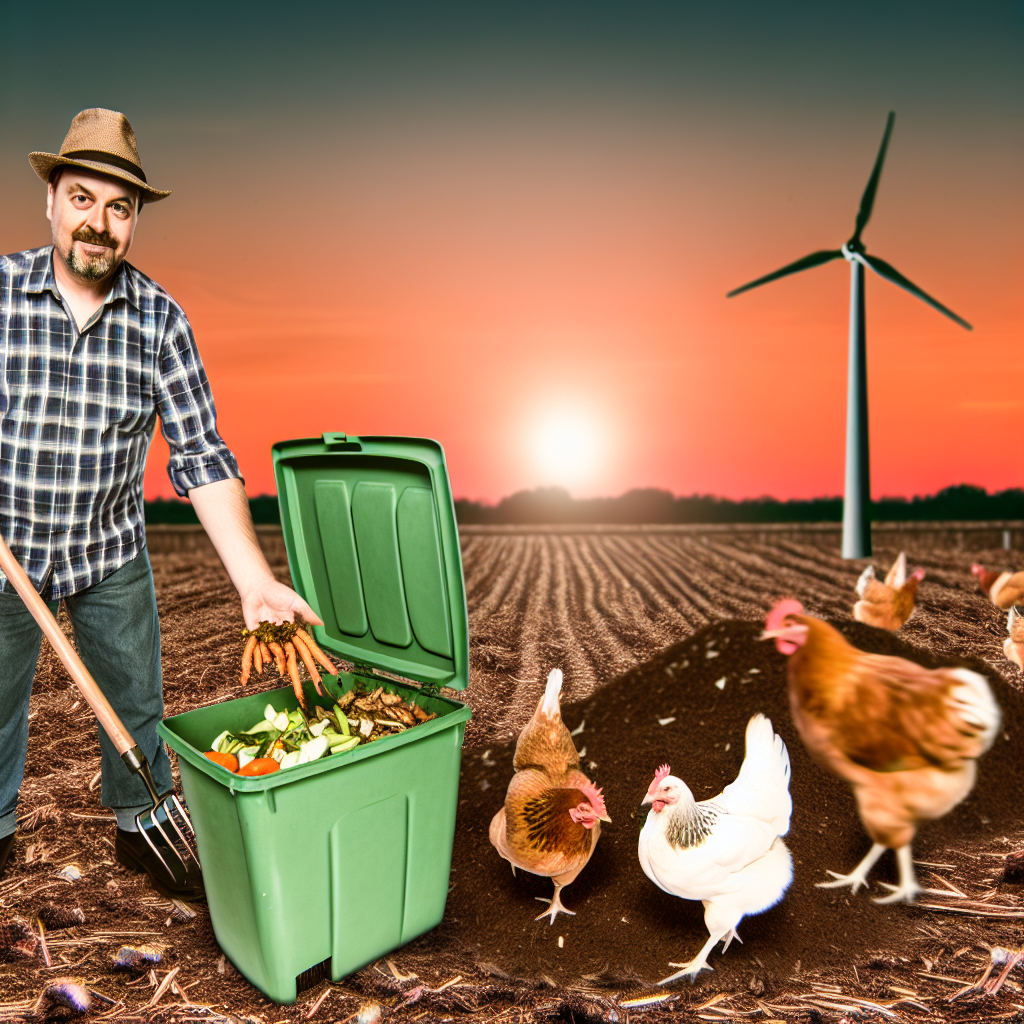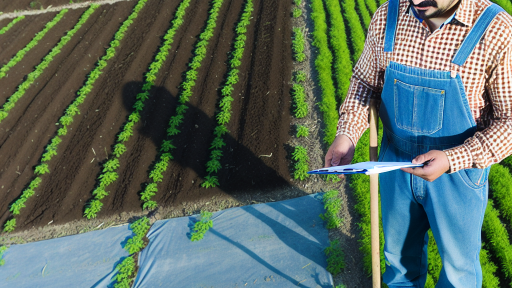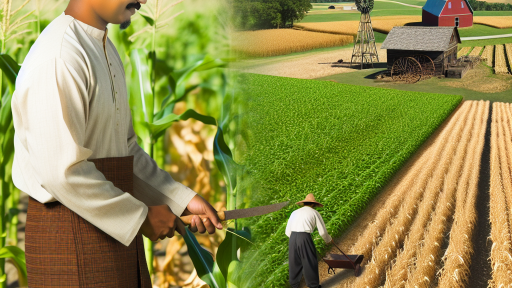Introduction to Eco-Friendly Waste Reduction Methods
Farms generate significant waste, impacting the environment adversely.
Implementing eco-friendly waste reduction methods can alleviate this issue.
Farmers can adopt various strategies to minimize waste generation effectively.
These methods not only reduce environmental harm but also enhance operational efficiency.
Understanding Waste on Farms
Waste on farms can be classified into several categories.
Organic waste includes crop residues, manure, and food scraps.
Additionally, non-organic waste consists of plastics, metal, and packaging materials.
Each category requires specific management techniques to reduce its impact.
Benefits of Waste Reduction
Reducing waste leads to numerous environmental benefits.
It decreases landfill use, which is crucial for sustainable development.
Moreover, it conserves natural resources and reduces pollution levels.
Farmers can also save money through efficient waste management practices.
Key Strategies for Waste Reduction
Several strategies can help farms minimize their waste output.
- Composting organic waste improves soil health and reduces waste volume.
- Implementing recycling programs ensures valuable materials are reused.
- Adopting digital management systems limits paper waste significantly.
These strategies contribute to a more sustainable farming practice.
Community Involvement and Education
Engaging the community promotes awareness about waste reduction.
Transform Your Agribusiness
Unlock your farm's potential with expert advice tailored to your needs. Get actionable steps that drive real results.
Get StartedEducational programs can teach sustainable farming practices to others.
Collaboration with local organizations can strengthen waste management efforts.
Through shared knowledge and resources, farms can encourage eco-friendly practices.
Benefits of Waste Reduction on Farms
Economic Impact
Waste reduction significantly decreases operating costs for farms.
By implementing eco-friendly practices, farmers can boost their profitability.
For instance, recycling organic matter can minimize disposal fees.
Additionally, reusing materials lowers the need for new resources.
Farmers can also save money on purchasing fertilizers through composting.
As a result, these savings can be reinvested into the farm.
Environmental Impact
Reducing waste helps protect local ecosystems.
When farmers minimize waste, they reduce landfill contributions.
This lowers greenhouse gas emissions associated with decomposition.
Moreover, efficient waste management protects water quality.
It prevents runoff from pollutants entering nearby water sources.
Furthermore, sustainable farming practices enhance soil health.
Social Impact
Eco-friendly waste reduction promotes community well-being.
Farmers adopting sustainable practices can enhance local food security.
This fosters community support for local agriculture.
Moreover, reducing waste can create job opportunities in green sectors.
Educational programs about waste reduction can benefit farmers and consumers alike.
Strong community ties improve overall quality of life for residents.
Composting Organic Waste: Techniques and Best Practices
Understanding Composting
Composting transforms organic waste into valuable soil amendments.
It enriches the soil and promotes healthy plant growth.
Farmers can utilize various materials for composting.
Showcase Your Farming Business
Publish your professional farming services profile on our blog for a one-time fee of $200 and reach a dedicated audience of farmers and agribusiness owners.
Publish Your ProfileCommon compostable items include fruit scraps, vegetable peels, and grass clippings.
By recycling these materials, farms can minimize waste.
Choosing the Right Method
Selecting an appropriate composting method is crucial.
Pile composting is ideal for larger quantities of waste.
Tumbler composters are suitable for smaller operations.
Trench composting offers a straightforward approach for gardens.
Batch composting allows control over the composting process.
Ingredients for Successful Composting
Two main types of materials are necessary: greens and browns.
Greens are nitrogen-rich and include fresh grass and vegetable scraps.
Browns are carbon-rich, such as dried leaves and straw.
A good ratio of greens to browns enhances decomposition.
Aiming for a 1:3 ratio of greens to browns promotes optimal results.
Maintaining the Compost Pile
Regularly turning the compost pile promotes aeration.
Aerating the composting materials encourages microbial activity.
Additionally, maintaining moisture is vital for decomposition.
The ideal moisture level resembles a damp sponge.
Overly wet or dry compost can hinder the composting process.
Using Finished Compost
After several months, compost will mature and darken in color.
Use finished compost as a soil amendment or fertilizer.
Applying it around plants supports growth and fertility.
Farmers should test the compost for nutrient content before use.
This ensures it meets specific crop requirements.
Discover More: Sustainable Recycling Practices in Agriculture
Utilizing Cover Crops to Minimize Field Waste and Enhance Soil Health
Benefits of Cover Crops
Cover crops provide numerous environmental benefits for farms.
They help reduce soil erosion during rainy seasons.
Additionally, cover crops improve soil moisture retention.
Moreover, they enhance the soil’s nutrient content organically.
Farmers notice increased biodiversity in their fields.
Types of Cover Crops
Several types of cover crops exist, each offering unique advantages.
Legumes, like clover, fix nitrogen in the soil.
Grasses, such as rye, prevent soil erosion effectively.
Brassicas, including radishes, break up compacted soil layers.
Farmers should select cover crops based on local conditions.
Implementing Cover Crops
Farmers can implement cover crops in rotation throughout the year.
They may sow cover crops after main crop harvests.
This practice allows farmers to maximize their land’s productivity.
Furthermore, they should integrate cover crops with other sustainable practices.
Managing Cover Crops
Proper management of cover crops is essential for success.
Farmers should monitor growth to prevent competition with main crops.
They can terminate cover crops before planting the main crops.
Showcase Your Farming Business
Publish your professional farming services profile on our blog for a one-time fee of $200 and reach a dedicated audience of farmers and agribusiness owners.
Publish Your ProfileThis ensures minimal disruption to soil health and structure.
Case Studies of Successful Use
Many farms have reported success using cover crops.
For example, Green Meadows Farm increased yields by 15%.
Another farm, Red Barn Organics, improved soil quality significantly.
These success stories demonstrate the effectiveness of cover crops.
Gain More Insights: Designing Crop Rotation Systems for Sustainable Farms
Implementing Soil Health Practices
Importance of Crop Rotation
Crop rotation plays a crucial role in maintaining soil health.
It helps break pest and disease cycles in crops.
Additionally, it improves soil structure and fertility.
Farmers can enhance biodiversity by rotating crops.
This practice reduces the need for chemical fertilizers.
Moreover, it promotes efficient nutrient use from the soil.
Lastly, diverse crop production can lead to better economic stability.
Minimal Tillage Benefits
Minimal tillage significantly benefits soil health and structure.
This method reduces soil erosion and compaction.
Furthermore, it improves water retention in the soil.
By disturbing the soil less, microorganisms thrive better.
Additionally, minimal tillage enhances organic matter levels.
This results in improved nutrient cycling within the soil.
Farmers also save on fuel and labor costs.
Combining Crop Rotation and Minimal Tillage
Combining both strategies maximizes soil health benefits.
Incorporating diverse crops while reducing tillage enhances resilience.
This integrated approach promotes sustainable farming practices.
Farmers can create a more balanced ecosystem in their fields.
Ultimately, these methods contribute to long-term agricultural sustainability.
See Related Content: Managing Grazing for Carbon Sequestration

Recycling Agricultural Plastics: Methods and Impact on Sustainability
Overview of Agricultural Plastics
Agricultural plastics play a crucial role in modern farming.
They include films, containers, and other materials used daily.
However, their use generates significant waste.
Recycling agricultural plastics can mitigate these environmental challenges.
Methods for Recycling
Several methods exist to recycle agricultural plastics efficiently.
Firstly, collection programs facilitate the gathering of used plastics.
Local farmers can coordinate with centers for convenient drop-off.
Secondly, chemical recycling offers innovative ways to repurpose plastics.
This process breaks down plastics into their original components.
Furthermore, mechanical recycling involves shredding and remelting plastics.
This method produces new products, reducing the need for virgin materials.
Innovations in Recycling Technologies
Advancements in recycling technology enhance efficiency.
For instance, the use of pyrolysis converts plastic waste into fuel.
Moreover, new sorting technologies improve material recovery rates.
Showcase Your Farming Business
Publish your professional farming services profile on our blog for a one-time fee of $200 and reach a dedicated audience of farmers and agribusiness owners.
Publish Your ProfileThese innovations lower costs and increase the quality of recycled products.
Impact on Sustainability
Recycling agricultural plastics significantly benefits the environment.
It reduces landfill waste and lowers greenhouse gas emissions.
Additionally, recycled materials conserve natural resources.
Farmers can also save money by using recycled products.
Case Studies of Successful Programs
Many regions demonstrate successful recycling initiatives.
For example, the California Agricultural Plastic Recycling Program collects used plastics annually.
Similarly, the North Carolina program has increased recycling rates significantly.
These initiatives highlight the potential for national-scale implementation.
Community Engagement and Education
Community involvement is essential in recycling efforts.
Education programs raise awareness about proper disposal methods.
Workshops can teach farmers recycling techniques effectively.
Public participation in sustainability grants impactful results.
Future Directions
As demand for sustainable practices grows, so do recycling initiatives.
There is a push for more comprehensive policies and support systems.
Collaboration among farmers, recyclers, and government bodies can increase success.
Innovative approaches will define the future of agricultural plastic recycling.
See Related Content: Effective Crop Diversity Strategies for Sustainable Farms
The Role of Technology in Waste Reduction
Innovations in Waste Management
Farmers now use advanced technology to manage waste effectively.
Innovations, such as anaerobic digesters, convert waste into useful energy.
This process not only reduces waste but also generates renewable energy.
Moreover, precision farming tools optimize resource use and minimize waste.
Farmers can track inputs closely, reducing unnecessary application of fertilizers and pesticides.
Smart Monitoring Tools
Farmers benefit from smart sensors that monitor environmental conditions.
These sensors collect data on soil health and moisture levels.
Farmers can use this data to make informed decisions about planting and irrigation.
This reduces water usage and minimizes chemical runoff into nearby waterways.
Additionally, integrated farm management software helps in planning and tracking farm operations.
Waste Reduction Strategies through Technology
Using technology, farmers implement effective waste reduction strategies.
- Composting organic waste adds valuable nutrients back into the soil.
- Using leftover plant materials for animal feed maximizes output and minimizes waste.
- Practicing crop rotation improves soil health while reducing pest build-up.
These strategies not only reduce waste but also contribute to sustainable farming.
Emerging Technologies
Several emerging technologies hold promise for waste reduction in farming.
Drones provide valuable insights by monitoring crop health from above.
They help farmers identify areas that require attention without excessive input.
Additionally, artificial intelligence can analyze data from various sources to improve efficiency.
These advancements create a more sustainable farming environment.
Case Studies: Successful Implementations of Eco-Friendly Waste Reduction on Farms
Introduction to Case Studies
Various farms worldwide have pioneered eco-friendly waste reduction methods.
These case studies highlight innovative practices in waste management.
Understanding these examples can inspire sustainable solutions for all farmers.
Sustainable Practices: A Closer Look
Farmers have adopted composting as a key strategy for waste reduction.
Using compost improves soil health while reducing organic waste.
Showcase Your Farming Business
Publish your professional farming services profile on our blog for a one-time fee of $200 and reach a dedicated audience of farmers and agribusiness owners.
Publish Your ProfileAdditionally, many farms now employ anaerobic digestion systems.
These systems convert waste into renewable energy and valuable byproducts.
Case Study: Green Valley Farm
Green Valley Farm implemented an advanced composting system in 2021.
This system utilizes kitchen scraps, crop residues, and animal waste.
As a result, the farm reduced its landfill waste by 40% within one year.
Moreover, the organic compost produced enhanced crop yields significantly.
Case Study: Sunny Acres Dairy
Sunny Acres Dairy focused on anaerobic digestion for waste management.
The farm collected manure and organic waste, processing it for energy.
This innovation not only generated power but also provided digestate.
The digestate served as a nutrient-rich fertilizer for crops.
Case Study: Riverview Orchards
Riverview Orchards utilized a zero-waste approach by recycling resources.
The farm introduced techniques for using all parts of harvested fruits.
Peels and cores became additions to their composting program.
This approach reduced waste and improved soil fertility.
Impact of Eco-Friendly Practices
These case studies showcase the benefits of eco-friendly waste reduction.
Farms experience cost savings and enhanced sustainability through these methods.
In addition, they contribute positively to local ecosystems and communities.
Farmers worldwide are now motivated to adopt similar practices.
Future of Farming and Waste Reduction
Adopting eco-friendly practices is essential for the future of farming.
As awareness grows, more farmers will explore innovative solutions.
Continued research and investment in sustainable techniques are crucial.
Together, farmers can build a resilient and eco-conscious agricultural system.
Additional Resources
What is Sustainable Agriculture? | Union of Concerned Scientists
Sustainable Agriculture & Earth-Friendly Farming to Combat Food …




